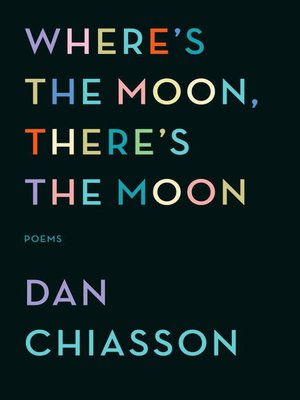
Sign up to save your library
With an OverDrive account, you can save your favorite libraries for at-a-glance information about availability. Find out more about OverDrive accounts.
Find this title in Libby, the library reading app by OverDrive.



Search for a digital library with this title
Title found at these libraries:
| Library Name | Distance |
|---|---|
| Loading... |
These are powerfully original poems about the sweetness and pain of adulthood and fatherhood by the critically acclaimed poet Dan Chiasson.
A child’s improvised game of “Where’s the moon, There’s the moon” is the shaping metaphor for this collection, but adult matters of seeking and finding, loss and recovery, anticipation and desire’s uncertain rewards are at its heart. Chiasson makes poignant use of objects and nature’s givens as correlatives for our human struggles: “Being near me never made anyone a needle,” he writes in “Thread,” and in the poem titled “Tree,” “All day I waited to be blown; / then someone cut me down.” In the title sequence, a multipart poem about fathers and sons, Chiasson describes the ways the gift for being absent, a poet’s gift, is passed from father to son, as he watches his own children sink into the enigmatic silences that mimic his own—silences that he, in turn, connects with his own father’s disappearance from his life.
Chiasson is a poet of great grief and love. In this third book, his voice is more commanding than ever, embracing the notion of how small—yet how rich and significant—are our individual stories in time and space.
A child’s improvised game of “Where’s the moon, There’s the moon” is the shaping metaphor for this collection, but adult matters of seeking and finding, loss and recovery, anticipation and desire’s uncertain rewards are at its heart. Chiasson makes poignant use of objects and nature’s givens as correlatives for our human struggles: “Being near me never made anyone a needle,” he writes in “Thread,” and in the poem titled “Tree,” “All day I waited to be blown; / then someone cut me down.” In the title sequence, a multipart poem about fathers and sons, Chiasson describes the ways the gift for being absent, a poet’s gift, is passed from father to son, as he watches his own children sink into the enigmatic silences that mimic his own—silences that he, in turn, connects with his own father’s disappearance from his life.
Chiasson is a poet of great grief and love. In this third book, his voice is more commanding than ever, embracing the notion of how small—yet how rich and significant—are our individual stories in time and space.







